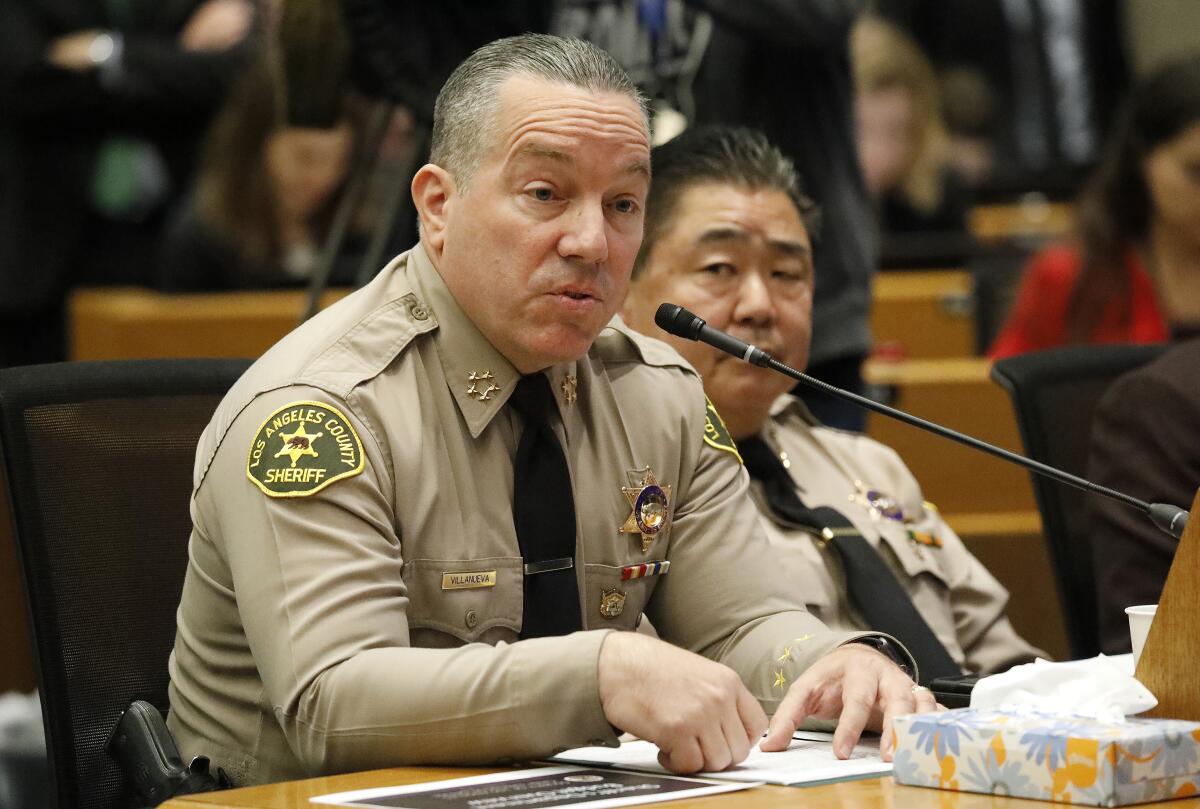Villanueva’s top aide allegedly used racial slur to describe Black, Latino employees

Los Angeles County Sheriff Alex Villanueva’s second in command used a Japanese racial slur to refer to employees of color and drew a rebuke from a county oversight panel for his behavior, according to law enforcement sources and court filings.
After reviewing a sheriff’s investigation into the claims against Undersheriff Tim Murakami, the County Equity Oversight Panel concluded Murakami violated the department’s policy against discrimination and urged the Sheriff’s Department to take “appropriate administrative action” against him, an internal record of the case reviewed by The Times shows.
The record — a letter from a sheriff’s official formally notifying a lieutenant who made the accusations of the panel’s decision — does not address whether the panel found that Murakami referred to Black and Latino employees using the slur, considered to be the Japanese version of the N-word.
In an interview with The Times, Murakami denied using the slur toward subordinates. He said he had heard the term and used it as a child, but now, “it’s just not part of my vocabulary.” He said he did not know if he considers the word derogatory.
The Sheriff’s Department declined to comment, citing pending litigation.
The case against Murakami comes after incidents in which other sheriff’s officials and Villanueva himself have drawn criticism for racist or insensitive remarks. Such episodes have taken on heightened significance at a time when policing in the U.S. is under intense scrutiny amid widespread allegations of bias against minorities.
Under Villanueva, Murakami rocketed to the top of the department after four decades as a deputy and midlevel commander. Soon after taking office in 2018, Villanueva promoted Murakami three ranks at once to make him one of the department’s assistant sheriffs. A few months later, Villanueva abruptly removed then-Undersheriff Ray Leyva and promoted Murakami again.
Before being elevated by the sheriff, Murakami served as a captain running the department’s station in Industry. His tenure there was not without controversy. Last year, a jury awarded $8.1 million to an Industry deputy who alleged he suffered retaliation and harassment by Murakami and others after he complained about misconduct at the station.
The investigation into Murakami’s comments stemmed from a legal claim filed earlier this year by Lt. Carlos Parga, a department veteran of Mexican descent who alleged Murakami regularly used the epithet toward him and in his presence when discussing Black job candidates at the Industry station.
A Black lieutenant who applied for a position under Murakami, Tracy Stewart, also filed a legal claim, which is a precursor to a lawsuit. In it, she alleges Murakami denied her the job because of her race and that the Sheriff’s Department routinely passes over Black candidates for senior-level positions.
“He’s demonstrated a racial animus” through his use of the slur, Alan Romero, an attorney representing both Parga and Stewart, said of Murakami.
Parga declined through his attorney to comment for this report. Stewart did not hear Murakami use the word, according to the legal claim she filed with the county, but told The Times she was disappointed to learn that Murakami allegedly used it to refer to her. “After hearing that, a lot of things started to make sense,” she said.
“I would have been OK not getting the job, because sometimes that’s just how it goes. But to think that I would have never even been considered because of my race made me physically ill,” Stewart said. “This was information that was brought to my attention and not something I sought out. At some point, you have to take a stand.”
Parga, who filed a retaliation and discrimination lawsuit in June, worked as a lieutenant for Murakami from August 2016 until March 2018, Romero said. Murakami, who is Japanese American, knew that Parga spoke some Japanese, the attorney said.
During that time, Parga alleges in his lawsuit, Murakami directed multiple comments at him, telling him, “You’re as dumb as a ... ,” adding the slur, and again saying, “I’m not going to give those ... a job,” in reference to Black employees.
The lawsuit also alleges that Murakami once commented aloud about his wife’s Mexican heritage, saying, “If it wasn’t for me, my kids would be dumb.”
In his lawsuit, Parga alleges Murakami has blocked several of his attempts to transfer to new positions within the department and claims supervisors refuse to promote him out of fear Murakami will retaliate against them if they do. The lawsuit also alleges Murakami told various sheriff’s employees that as long as he remained at the department, Parga would not advance.
After Parga filed his legal claim against the county, which included a summary of his accusations, sheriff’s officials opened an internal affairs investigation into him, alleging he had failed to report the derogatory remarks when he first heard them, Romero said. That investigation found the charges against Parga to be unresolved, Romero said.
Parga’s allegations against Murakami were investigated by the department’s equity investigations unit, which forwarded the case to the County Equity Oversight Panel. Following a meeting in September, the panel concluded Murakami had violated the department’s policy against racial discrimination and harassment, according to the letter reviewed by The Times, which was sent to Parga late last month by the sheriff’s internal affairs bureau.
Law enforcement sources familiar with the investigation and Romero said the panel reviewed interviews that sheriff’s investigators conducted with Parga and a second law enforcement officer who said he heard Murakami use the slur.
The panel recommended that the Sheriff’s Department adopt its findings and take steps to address the misconduct, according to the letter. A spokesman for the Sheriff’s Department did not answer questions about the agency’s response to the panel’s recommendation. Murakami said he was not notified of the panel’s findings nor disciplined.
Murakami denied he or other senior officials in the department have treated Black and Latino employees unfairly and said there are “plenty of African American executives I support and promote.” He named several Black executives, and said the allegations in the lawsuit were fabricated against him to disparage his reputation by people upset over their failure to advance.
A retired sheriff’s lieutenant, who is Black and asked to remain anonymous, told The Times that when he worked under Murakami at the Industry station, Murakami once referred to him as “you people,” which he took to be a reference to his race. The lieutenant said he filed a complaint alleging nepotism and unfair treatment to people of color at the station, which was determined to be unfounded.
The Sheriff’s Department has struggled with controversies over racist comments sent by department personnel via email or posted on social media.
Villanueva has faced criticism within the agency for his own racially insensitive remarks. Over the summer, he likened L.A. County Supervisor Hilda Solis to La Malinche, a term used to demean a woman as a traitor or sellout. The name refers to a historical figure in Mexican culture who was the interpreter and slave of the Spanish conqueror Hernán Cortés and became a symbol of betrayal for facilitating the conquest of the Aztec empire.
And in 2012, Villanueva and the department were sued by a Black custody assistant who said Villanueva referred to him as a “knuckle dragger,” which the jailer interpreted as a racial slur. Villanueva has denied making the comment and said there was no finding of wrongdoing. The county settled with the custody assistant for $10,000.
In July, Villanueva’s former chief of staff was reassigned after posting on social media that Andres Guardado, the 18-year-old who was fatally shot in the back by a deputy in Gardena in June, “chose his fate.”
A sheriff’s spokeswoman, Deputy Juanita Navarro-Suarez, was also removed from her post after she posted racist stereotypes in reference to a reward for information leading to the arrest of the suspect in the ambush shooting of two deputies sitting in a patrol car in Compton.
She later deleted the posts. When asked to respond at the time, she said: “Everyone has an opinion, and that’s it.”
More to Read
Start your day right
Sign up for Essential California for news, features and recommendations from the L.A. Times and beyond in your inbox six days a week.
You may occasionally receive promotional content from the Los Angeles Times.







